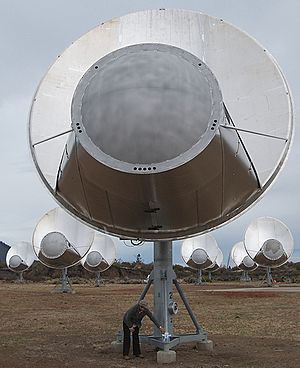Drake equation facts for kids
The Drake Equation is a famous idea from 1961 by a scientist named Frank Drake. It's a way to think about the chance of finding intelligent alien life in our Milky Way galaxy that we could actually talk to.
Sometimes people call it the Green Bank equation. You might also hear it linked to Carl Sagan, another famous scientist, because he talked about it a lot.
Contents
What is the Drake Equation?
The Drake Equation looks like this:
It helps us think about how many civilizations in our galaxy might be able to communicate with us.
Here's what each part means:
- N = The number of civilizations in our galaxy that we could possibly talk to.
- R* = How many new stars are born each year in our galaxy.
- fp = The fraction (or percentage) of those stars that have planets orbiting them.
- ne = The average number of planets around each star that could possibly support life.
- fℓ = The fraction of those planets where life actually starts to grow.
- fi = The fraction of planets where life develops into something intelligent.
- fc = The fraction of intelligent civilizations that create technology that sends signals into space, which we could detect.
- L = How long these civilizations keep sending out detectable signals.
Why is it hard to solve?
We don't have a clear answer for the Drake Equation. It's not really meant to give us an exact number. Instead, it's a tool to help us think about all the things that need to happen for alien life to exist and for us to find it.

The biggest challenge is that we don't know the values for the last few parts of the equation. For example, we don't know how often life becomes intelligent, or how long advanced civilizations last. These numbers could be very, very different!
Because of this, groups like the SETI League say the equation's real value isn't in solving it. It's in making us ask important questions about life in the universe. It helps us see it as a series of steps, like a numbers game.
Related pages
Images for kids
-
Dr. Frank Drake
See also
 In Spanish: Ecuación de Drake para niños
In Spanish: Ecuación de Drake para niños
 | Shirley Ann Jackson |
 | Garett Morgan |
 | J. Ernest Wilkins Jr. |
 | Elijah McCoy |



